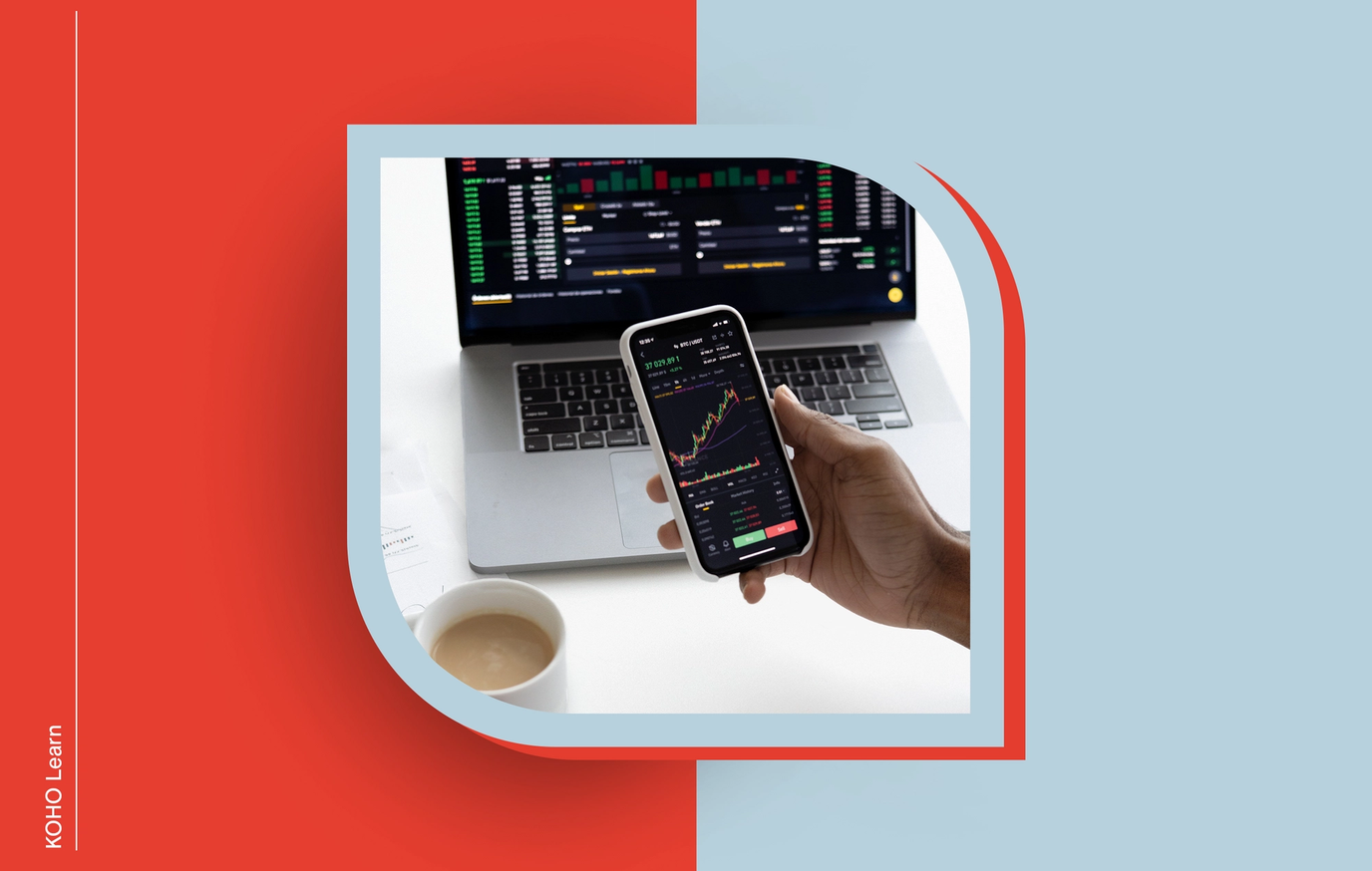Back to learn
What is financial literacy?

Written By
Rounding it up
Financial literacy is not just having the knowledge about the financial ecosystem but being able to take actions that lead to favourable financial outcomes for you.
Financial literacy encompasses a variety of topics such as personal finance, budgeting, and banking tools, among many others.
Being financially literate helps you become a smarter spender, build financial resilience, and be in more control of your money.
Financial literacy can be defined as not only the knowledge needed to make informed financial and spending decisions, but also the practicing of behaviors that lead to favourable financial outcomes. The second part of the definition is especially important, because just knowing the facts, statistics, and terms of the financial world is not enough – you need to understand what the data means and use it to make better money-related decisions.
Financial literacy can include:
Understanding basic financial concepts such as budgeting, investments, debt, taxes
Being able to plan your own finances for the present, while thinking about the future
Knowing about different government programs and banking tools at your disposal
Why is financial literacy important?
Did you know 70% of Canadians say Canada is becoming unaffordable, according to the latest Canada and Money Survey? Today, the majority of Canadians have a variety of fixed expenses to think about: planning for retirement, mortgage repayment, student debt, increasing rent costs, rising grocery bills – just to name a few. In light ever-growing fixed expenses, financial literacy becomes even more important as it helps you make informed decisions about how to spend your money.
Becoming financially literate may sound like extra work, but it pays off. It can help:
Maximize your income and benefits
Effectively navigate taxes and other government programs
Pay off debt quicker
Use credit strategically
Plan for your future
How do you become more financially literate?
Financial literacy in the present day is a lot more complex than it was a few decades ago, and that’s mainly due to the following factors:
Digitization of financial services
Changes in the consumer spending habits
Variety of financial products available in the market today
Earlier, when people solely depended on cash for making purchases, being aware of your financial situation was relatively straightforward. But in this era of online shopping, numerous credit cards, and flexible payment plans, it’s a lot harder to keep your spending in check. Due to the emergence of all these convenient ways to shop, consumers are enticed into spending more than they can probably afford. So, while digitization and availability of flexible financial options has made a better lifestyle more accessible, it has also added a level of complexity to how we perceive our finances.
In fact, the Government of Canada’s vision, according to their 5-year National Financial Literacy Strategy for 2021-2026, is to build financial resilience in an increasingly digital world to help Canadians “confidently navigate financial decisions in challenging times and a digital economy.”
Despite these challenges, there are some simple things we can do in our daily lives to become financially literate and manage money more efficiently.
Start with day-to-day expenses; budgeting is your friend!
Close to half of Canadians have a budget, be it through apps, spreadsheets, or simple pen-and-paper. That means the other half has no idea where and how much they spend.. No matter what method you use, learning how to budget is essential to becoming financially literate. That’s because budgeting is closely associated with being able to pay off debt faster, which can eliminate financial worry and stress.
Budgeting starts with having an accurate idea of how much money you have coming in. Calculate your income from your employment, side hustles, rental income, or tax credits. Next step: look into the money going out. Familiarize yourself with all your expenses, like your rent, utility and grocery bills, travel and transportation expenses, childcare costs — everything.
After you build a good enough understanding of your spending habits, you can start to see patterns and spot unnecessary expenses. Ask yourself: Do I need this or do I want this? If you need it, it’s a necessity. If you want it for purposes you can’t justify, it’s an expense. Start to cut back on those. And remember to start small—if you deprive yourself of all the luxuries in one go, you will get frustrated pretty soon and fall back into your old habits.
With budgeting, it’s important to set realistic expectations. Always be thinking about the larger goal—whether it is paying off debt or putting aside savings for your future plans. Depending on your income and expenses, experts recommend setting aside 10-20% of your paycheque for your future, when possible. Having a goal associated with your budget will help you stick to it, even when it’s the hardest to not succumb to temptations.
While it may be tedious, budgeting is an essential ingredient in developing a more financially literate self. It can show you how to maximize your income and encourages you to think of your financial future.
If you're still feeling unsure of how to start, there are plenty of resources to help you better manage your money, like this Ultimate Budget template, and KOHO’s in-app budgeting tool.

Get comfortable with investing
As the pandemic showed us, the future is full of uncertainties. If you’re always living paycheque-to-paycheque, you leave yourself with little to no room for any emergencies or unexpected events that come your way. Learning how to invest your money is important because it helps you be prepared for planned events such as your retirement, your children’s college expenses, as well as unplanned expenses such as loss of a job or a tragic life event. Think about what your purchases and financial choices will do for you in the future, instead of only in the present.
Yes, investing seems intimidating. Especially when there are so many options: ETFs, RRSPs vs TFSAs — the list of confusing acronyms seems endless. Take assurance in knowing they’re all perfectly acceptable forms of investment. The key is identifying which one best suits your needs the best.
When it comes to investing, research is key. Rather than jumping into the stock market right away, take time to educate yourself on what’s out there and how they line up with your values and financial scenario. Investments are all about making decisions for the future you — when you think of that person more often, you become more and more financially literate.
Credit checks, scores, cards
Part of being financially literate is more than just knowing about credit score and forms of credit; it’s about making credit your friend.
Maintaining a good credit score is essential to being approved for credit, whether it’s for a mortgage, car lease, or business loan. Educating yourself on what actions can improve and hurt your credit will help you be more financially literate.
Similarly, it’s important to know how hard and soft credit checks can impact your credit score. Checking your credit score multiple times a year can result in minor marks on your score. Some checks are “hard” and the impact stays on your credit report for 1-2 years, while others are “soft” and do not affect your credit report. You should learn about the kind of credit that’s available to you, and know which forms are most suitable for your financial situation.
Similarly, with the variety of credit card options available to you today, it’s easy to get confused about which credit card is the best for you. Some cards offer significant cash back on certain types of purchases while some cards help you build your credit history. A few credit card providers offer you pre-approved credit cards while others need a hard credit check. Again, there’s no right or wrong answer here—it depends on your situation and what you’re looking to use the credit card for.
Financial literacy combats tax anxiety
Taxes have notoriously brought stress to Canadians for who-knows-how-long, and the anxiety associated with tax season undoubtedly increased over the pandemic. Luckily, there are ways to combat tax anxiety, and doing so will help you become more financially literate.
The first step is education — educate yourself on how much of your money goes to taxes, to which credits and deductions you are entitled, and how you can maximize these credits. The Government of Canada and CPA Canada offer many resources to help Canadians learn more about taxes.
If you’re still having trouble understanding your taxes, you can go to a free tax clinic for support or hire an accountant. Having your taxes up-to-date and organized gives you better knowledge of your financial situation (AKA better financial literacy!), and can in turn, help you plan for the future.
The bottom line — financial literacy is attainable!
With all the resources out there, financial literacy is no longer a distant dream. Educating yourself is the first and most effective way to live a more financially stable and prosperous life.

Chrissy Kapralos
Chrissy is a freelance writer and editor who is passionate about making financial education accessible. She is also a communications advisor for the Ontario Ministry of Energy, Northern Development and Mines. When she isn't writing, you can find her practicing yoga or watching horror movies.